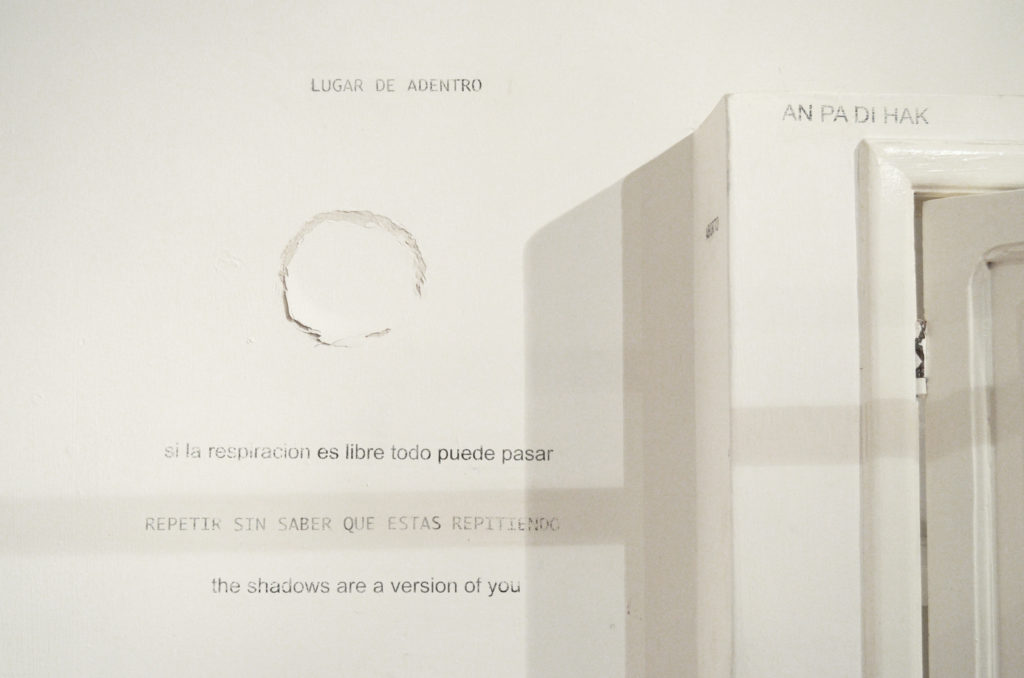Call for Papers: Radical imaginings: art practices of/for justice (working title) – Kunstlicht Vol. 40 (2019) No.1

Image: Minia Biabiany, SiEntaXis (sex sintaxis), Cráter Invertido, México DF, 2015, Installation. Courtesy of the artist.
“I find the grammar of justice maddening. It’s always “rendered,” “served,” or “done.” It always swoops down from on high — from God, from the state — like a bolt of lightning, a flaming sword come to separate the righteous from the wicked in Earth’s final hour. It is not, apparently, something we can give to one other, something we can make happen, something we can create together down here in the muck.”– Maggie Nelson, The Red Parts. Autobiography of a Trial, 2017.
Proposal Deadline: 15th December 2018
Issue Release: Spring 2019
Editor: Aline Hernández
When dealing with our colonial pasts, social inequalities, and legacies of oppression, the concept of transitional justice, as seen from the grammar of law, has historically been used to enable people to ‘overcome’ or ‘transition’ away from a given traumatic experience by means of a vast array of institutionalized practices. From prosecuting criminals, compiling, systematizing, and incorporating victims’ testimonials into one grand narrative — a strategy proper of modernity — to envisioning legal and social forms of ‘compensation’, what these understandings and practices have in common is that they take justice as a tool and a product of the state. In effect, however, by approaching justice in this way, these practices often overlook living realities, gradations, and fluctuations of violence, multifaceted experiences, and forms of subjectivity that cannot be expressed within their frameworks.
In essence, in its detachment from the living, breathing, multivocal communities and on-the-ground situations, the concept of justice (and transitional justice in particular) is often held hostage by state-apparatuses. A telling example is that of tribunals in South Africa where the stories of women and other marginalized groups remain voiceless/invisible. Many women, for example, were faced with the paradox of being asked to speak up and bring rapists to justice, which in turn placed them in greater danger of continued violence, not to mention the unwarranted state of vulnerability implied in the embodied act of reenacting traumatic experiences for the eyes of the ‘judicial arbiter’. As such, it is no surprise that many chose to remain silent. The kind of justice that these women were presented with only helped to create the illusion of dealing with violent histories; while making sure that production of injustice and a placebo pill for its ‘containment’ are both created and administered by the neoliberal state, ensuring the former’s legitimation through the apparent fulfilment of human rights. This is one case amongst many others where the inability of addressing nuances through an intersectional approach ends up translating into in-difference, separateness, and a conspicuous absence of plural voices – in this case, women’s voices.
Such “easy fix solutions” of moving “from – to” (Bell and O’Rourke 2007) through state-frameworks often go around structural inequalities and ongoing dependencies, they remain within the surfaces while ignoring the fact that what originated these forms of violence in the first place, remains active in the global present — to echo Denise Ferreira da Silva’s words. In most contexts, the processes of inequality are long-term and structural, and the legacies of coloniality are hardly contained within the binaries of retributive and restorative justice systems that stem from western epistemologies.
Centering on the idea that what is at stake in current neoliberal regimes is the dispossession of our ability to imagine, see, and desire differently, we are opening the call to papers, discussions, and artistic contributions that invite an alternative focus on ways of understanding and practicing justice and wound healing beyond the state structures (ways that already exist, albeit with limited visibility). As such, in this call, we are opening the field to thinking through/from/on art practices (among others) that aim to overcome justice as a process of going “from – to” as administered by the state and that go against the erasure of structural and colonial violence that this eurocentric western-centric binary entails. This could entail understandings of wound healing that surpass the tiresome formula for top-down effective repair, or even practices of what Eve K. Sedgwick (2002) has denominated as “reparative readings,” — readings of matters done “on the side of multiplicity, surprise, rich divergence, consolation, creativity, and love” (Love, 2010), wherein repair is not to be mistaken with compensating for the damage done.
Proposals (200-300 words) with attached résumés can be submitted until December 15th via redactie@tijdschriftkunstlicht.nl. Selected authors will be invited to write a 2,000 to 3,000-word paper (excluding notes). Authors who publish in Kunstlicht will receive three complimentary copies. Unfortunately, Kunstlicht is not able to provide an author’s honorarium. Two years following publication, papers will be submitted to the freely accessible online archive.
We also welcome image-based and experimental text contributions, as well as proposals for performances/installations/other works. The publication will be accompanied by a launch event in Amsterdam, coordinated by Emilie van Heydoorn, where selected works will be shown. We cannot, however, guarantee that all proposals will be given a stage and the editorial board reserves the right to decline contributions.
Aline Hernández (México, 1988) is a Fundación Jumex Arte Contemporáneo scholar currently pursuing a master’s in Media, Arts, and Performance Studies at Utrecht University. She works as a writer and translator and is part of the editorial board of Kunstlicht. She is also a member of the activist-artist run cooperative Cráter Invertido based in México City. Her work has been published in journals such as Parkett, Das Platforms, and recently, The New Inquiry. Her research interests include pain, gender violence, and feminist technoscience.
Kunstlicht is an academic journal for visual art, visual culture, and architecture, founded in 1980. It is affiliated with the Arts & Culture department of the Vrije Universiteit Amsterdam, but operates from an independent foundation. Kunstlicht is published three times a year, and features both scholarly and artistic contributions.
